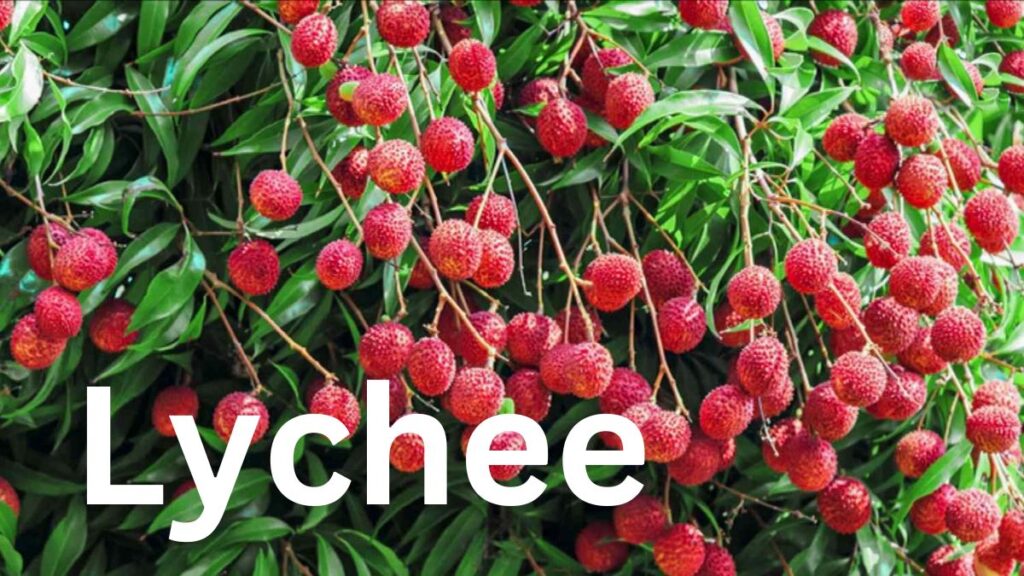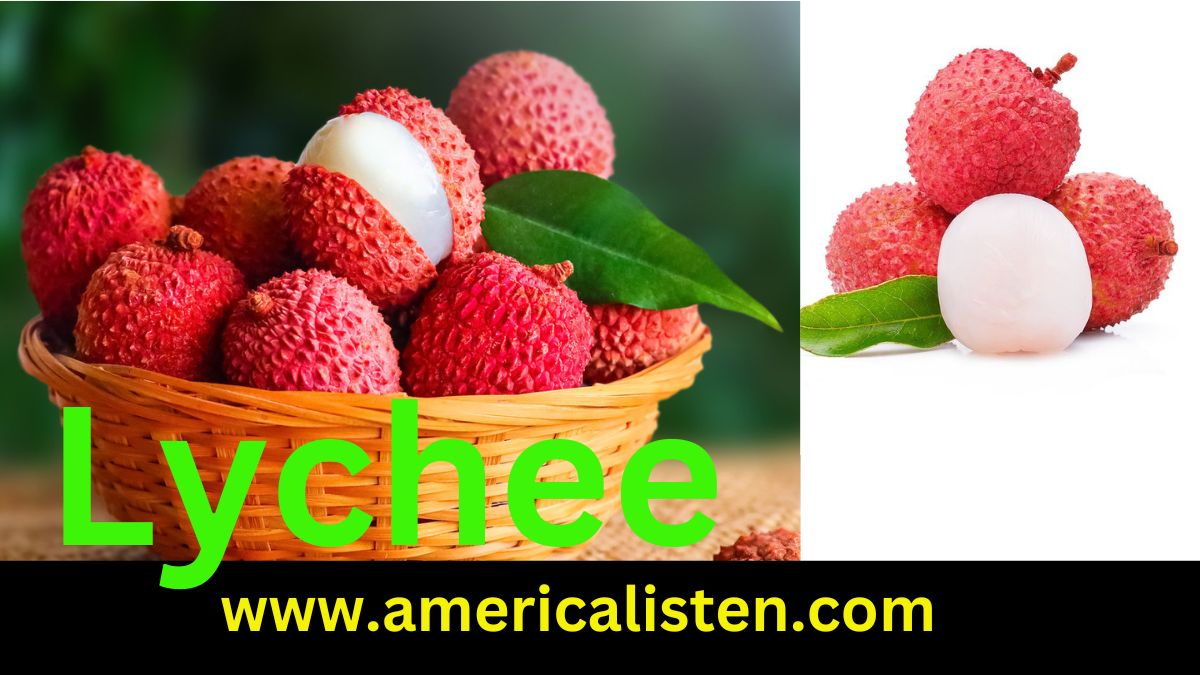In the world of exotic fruits, few can match the delicate sweetness and aromatic allure of the lychee. Hailing from the tropical regions of Southeast Asia, this small, translucent fruit has not only captured the taste buds of millions but also boasts a rich historical background that adds an intriguing layer to its allure. Join us on a journey through time as we unravel the fascinating history of the lychee.
1.Lychee and its Benefits
2.Lychee and its Medical Benefits
3.Recipes Of Lychee
4.Side Effects Of LyChee
Ancient Roots
The lychee, scientifically known as Litchi chinensis, traces its roots back to ancient China, where it earned the moniker “Chinese Strawberry.” Historical records suggest that lychee cultivation dates as far back as 1059 AD during the Southern Song Dynasty. The fruit was held in high esteem, often reserved for the imperial court and esteemed guests, symbolizing good luck and prosperity.
Imperial Symbolism:
Lychee’s popularity grew exponentially during the Tang and Ming dynasties, earning its place as a symbol of love and romance. Legend has it that the famed Yang Guifei, one of China’s Four Beauties, had a particular fondness for lychees. The fruit became associated with love, beauty, and luxury, finding its way into ancient poetry and artworks as a token of affection.
Spread Across Continents:
As trade routes expanded, the lychee made its way to other parts of the world. Historical accounts suggest that it reached India by the 17th century and later journeyed to the Middle East and Africa. European explorers and traders encountered the fruit in the 18th century, marveling at its unique taste and texture.
Lychee in the Modern Era:
The lychee continued its global journey and found a new home in tropical and subtropical regions, including parts of the Americas and Australia. Its adaptability to various climates contributed to its widespread cultivation, making it a beloved fruit in many corners of the world.
Cultural Significance:
Beyond its delectable flavor, lychee has become deeply woven into the cultural fabric of the regions it inhabits. Festivals celebrating the lychee harvest are common in China and other Asian countries, featuring an array of traditional performances, culinary delights, and, of course, an abundance of lychee-based dishes.
Health Benefits and Culinary Delights:
Modern science has uncovered the nutritional benefits of lychee, revealing its richness in vitamin C, antioxidants, and other essential nutrients. Beyond its health merits, the fruit has inspired a myriad of culinary creations, from refreshing lychee sorbets to savory dishes that showcase its unique sweetness.
Conclusion:
The journey of the lychee through time is a testament to its enduring appeal and cultural significance. From its royal beginnings in ancient China to becoming a global culinary sensation, the lychee has transcended borders and generations, leaving a sweet legacy that continues to enchant and delight. As we savor the taste of this exotic fruit, let us also savor the rich history that has shaped the lychee into the beloved treasure it is today.

1.Lychee and its Benefits
The lychee, a small and delectable fruit, not only tantalizes the taste buds with its unique sweetness but also offers a range of health benefits. Packed with essential nutrients, antioxidants, and medicinal properties, the lychee proves to be more than just a flavorful treat. Let’s delve into the numerous advantages that this exotic fruit brings to the table:
- Rich in Vitamin C:
Lychee is a potent source of vitamin C, a crucial antioxidant that supports the immune system. Regular consumption of lychee can help boost your body’s ability to fight off infections and common illnesses. - Antioxidant Powerhouse:
The presence of antioxidants in lychee, such as polyphenols and flavonoids, contributes to its ability to combat oxidative stress. Antioxidants play a vital role in neutralizing free radicals in the body, potentially reducing the risk of chronic diseases and promoting overall well-being. - Supports Digestive Health:
Lychee contains dietary fiber, which aids in digestion and helps prevent constipation. The fiber content promotes a healthy digestive system by supporting regular bowel movements and maintaining the health of the gastrointestinal tract. - Heart Health:
The potassium and copper found in lychee contribute to heart health. Potassium helps regulate blood pressure, reducing the risk of cardiovascular diseases, while copper supports the production of red blood cells and promotes proper circulation. - Boosts Metabolism:
Lychee contains B-vitamins, including B6, niacin, riboflavin, folate, thiamine, and pantothenic acid, which play a crucial role in metabolism. These vitamins assist in converting food into energy and maintaining the optimal functioning of various bodily processes. - Skin Health:
The presence of vitamin C in lychee is not only beneficial for the immune system but also for the skin. Vitamin C supports collagen production, promoting skin elasticity and reducing the appearance of wrinkles and fine lines. - Cancer-Fighting Properties:
Some studies suggest that lychee may have anticancer properties due to its high content of polyphenols. These compounds may help inhibit the growth of cancer cells and reduce the risk of certain types of cancers. - Weight Management:
Lychee is a low-calorie fruit with no cholesterol, making it a healthy snack option for those looking to manage their weight. The fiber content also helps create a feeling of fullness, potentially reducing overall calorie intake. - Hydration:
With a high water content, lychee contributes to hydration, supporting various bodily functions. Staying adequately hydrated is essential for overall health, including maintaining proper skin health, temperature regulation, and nutrient transportation. - Antiviral and Anti-Inflammatory:
Compounds found in lychee have demonstrated antiviral and anti-inflammatory properties. These properties may help the body combat viral infections and reduce inflammation, contributing to overall health and well-being.
Incorporating lychee into your diet can be a flavorful way to enjoy a myriad of health benefits. Whether eaten fresh, added to salads, or blended into refreshing beverages, this exotic fruit adds not only a burst of sweetness but also a nutritional boost to your daily diet.
2.Lychee and its Medical Benefits
Lychee, beyond its delightful taste, boasts several medical benefits that contribute to overall health and well-being. This tropical fruit, rich in essential nutrients and bioactive compounds, has been associated with various medicinal properties. Here’s a closer look at the medical benefits of lychee:
- Immune System Support:
Lychee is a powerhouse of vitamin C, a crucial nutrient known for its immune-boosting properties. Adequate intake of vitamin C helps strengthen the immune system, providing defense against infections and illnesses. - Antioxidant Protection:
The antioxidants found in lychee, including polyphenols and flavonoids, play a vital role in neutralizing free radicals. This antioxidant activity helps protect cells from oxidative stress, which is linked to various chronic diseases and the aging process. - Anti-Inflammatory Effects:
Certain compounds in lychee exhibit anti-inflammatory properties. Chronic inflammation is associated with numerous health conditions, including heart disease, diabetes, and certain cancers. The anti-inflammatory effects of lychee may contribute to reducing the risk of these diseases. - Cardiovascular Health:
Lychee contains potassium, a mineral that plays a key role in maintaining heart health. Adequate potassium intake is associated with lower blood pressure, reducing the risk of cardiovascular diseases such as heart attacks and strokes. - Cancer Prevention:
Some studies suggest that lychee’s polyphenolic compounds may have anticancer properties. These compounds may help inhibit the growth of cancer cells and reduce the risk of certain types of cancers. However, further research is needed to fully understand the extent of lychee’s potential in cancer prevention. - Blood Sugar Regulation:
The fiber content in lychee may contribute to regulating blood sugar levels. Dietary fiber slows down the absorption of sugars, helping to prevent spikes and crashes in blood sugar. This can be beneficial for individuals with or at risk of diabetes. - Eye Health:
Lychee contains beta-carotene, a precursor to vitamin A, which is essential for maintaining eye health. Vitamin A plays a crucial role in preventing conditions such as night blindness and age-related macular degeneration. - Digestive Health:
The dietary fiber in lychee supports digestive health by promoting regular bowel movements and preventing constipation. A healthy digestive system is essential for nutrient absorption and overall well-being. - Antiviral Properties:
Compounds in lychee have demonstrated antiviral activity. While more research is needed, these properties may contribute to the body’s defense against certain viral infections. - Hydration and Electrolyte Balance:
With a high water content, lychee contributes to hydration, while its potassium content helps maintain electrolyte balance. This is particularly beneficial for overall muscle and nerve function.

It’s important to note that while lychee offers numerous potential health benefits, individual responses may vary. As with any dietary addition or modification, it’s advisable to consult with a healthcare professional, especially for individuals with pre-existing medical conditions or concerns.
Uese Of Lychee:
Lychee, with its unique flavor and nutritional profile, lends itself to a variety of uses in culinary, medicinal, and cosmetic applications. From refreshing beverages to skincare routines, here are some versatile ways in which lychee finds purpose:
- Fresh Consumption:
The simplest and most direct use of lychee is enjoying it fresh. Peel the outer skin to reveal the translucent, juicy fruit, and savor its sweet and fragrant taste. - Fruit Salads:
Lychee adds a burst of sweetness and a unique texture to fruit salads. Its floral notes complement a variety of other fruits, creating a refreshing and vibrant dish. - Smoothies and Juices:
Lychee’s sweet and aromatic flavor makes it an excellent addition to smoothies and fruit juices. Blending it with other fruits or combining it with yogurt creates delightful and nutritious beverages. - Cocktails:
The exotic taste of lychee makes it a popular ingredient in cocktails. Lychee martinis, mojitos, and other mixed drinks benefit from the fruit’s distinctive flavor. - Sauces and Condiments:
Lychee can be used to create unique sauces and condiments. Whether in a sweet and spicy salsa or a lychee-infused glaze for meats, its flavor profile adds depth to various dishes. - Desserts:
From ice creams and sorbets to cakes and puddings, lychee is a versatile ingredient in desserts. Its natural sweetness enhances the overall taste of sweet treats. - Preserves and Jams:
Lychee’s high sugar content makes it suitable for preserves and jams. The fruit’s unique taste adds a twist to traditional spreads, offering a delightful alternative to more common fruit preserves. - Candies and Confections:
Lychee flavor is often used in the production of candies, gummies, and other confections. Its distinct taste can be found in a variety of sweet treats. - Medicinal Teas and Tonics:
In traditional medicine, lychee has been used for its potential health benefits. Brewing lychee tea or infusing it into tonics provides a natural way to incorporate its medicinal properties. - Skincare Products:
Extracts from lychee are increasingly used in skincare products. The fruit’s antioxidants and vitamins may contribute to skincare routines, helping to nourish and protect the skin. - Culinary Garnish:
Lychee’s visual appeal and sweet fragrance make it an excellent garnish for both sweet and savory dishes, adding a touch of elegance to the presentation. - Aromatherapy:
Lychee’s fragrant aroma can be harnessed for aromatherapy purposes. Scented candles, essential oils, or potpourri with lychee fragrance can create a soothing atmosphere. - Culinary Experimentation:
Given its versatile flavor, lychee invites culinary experimentation. Chefs and home cooks alike use lychee in innovative ways, incorporating it into unique recipes to explore new taste experiences.
Lychee’s adaptability makes it a delightful addition to a wide range of dishes and products, enhancing both the taste and aromatic qualities of the final creations. Whether enjoyed fresh or integrated into various culinary and lifestyle applications, lychee continues to captivate with its sweet and exotic allure.
3.Recipes Of Lychee
Certainly! Here are three delightful recipes featuring lychee:
1. Lychee and Mint Sorbet:
Ingredients:
- 2 cups fresh lychee, peeled and deseeded
- 1/2 cup simple syrup (equal parts water and sugar, heated until sugar dissolves)
- 1 tablespoon fresh mint leaves, chopped
- 1 tablespoon lime juice
Instructions:
- In a blender, combine the lychee, simple syrup, mint leaves, and lime juice.
- Blend until smooth.
- Pour the mixture into an ice cream maker and churn according to the manufacturer’s instructions.
- Once churned, transfer the sorbet to a lidded container and freeze for at least 4 hours or until firm.
- Serve the lychee and mint sorbet in bowls or cones, garnished with additional mint leaves for a refreshing treat.
2. Lychee and Shrimp Summer Rolls:
Ingredients:
- Rice paper wrappers
- 1 cup cooked shrimp, peeled and deveined
- 1 cup rice vermicelli, cooked and cooled
- 1 cup fresh lychee, peeled and sliced
- Fresh mint leaves
- Lettuce leaves
- Dipping sauce (hoisin sauce mixed with a splash of soy sauce)
Instructions:
- Dip a rice paper wrapper into warm water for a few seconds until it softens.
- Lay the wrapper flat on a clean surface.
- Place a lettuce leaf in the center of the wrapper, followed by a handful of rice vermicelli, shrimp, lychee slices, and mint leaves.
- Fold the sides of the wrapper inward, then roll from the bottom to enclose the filling tightly.
- Repeat with the remaining ingredients.
- Serve the lychee and shrimp summer rolls with the dipping sauce for a light and flavorful appetizer.
3. Lychee and Chicken Stir-Fry:
Ingredients:
- 1 lb boneless, skinless chicken breast, thinly sliced
- 2 cups fresh lychee, peeled and deseeded
- 1 bell pepper, sliced
- 1 cup snap peas, trimmed
- 2 tablespoons soy sauce
- 1 tablespoon oyster sauce
- 1 tablespoon hoisin sauce
- 1 tablespoon sesame oil
- 2 cloves garlic, minced
- Cooked rice for serving
Instructions:
- In a bowl, mix the soy sauce, oyster sauce, and hoisin sauce.
- Heat sesame oil in a wok or large skillet over medium-high heat.
- Add sliced chicken and stir-fry until browned and cooked through.
- Add garlic, bell pepper, and snap peas. Stir-fry for 2-3 minutes until vegetables are slightly tender.
- Pour the sauce over the chicken and vegetables, add lychee, and toss to combine.
- Cook for an additional 2-3 minutes until everything is heated through.
- Serve the lychee and chicken stir-fry over cooked rice for a delicious and savory meal.
These recipes showcase the versatility of lychee, from refreshing desserts to savory main dishes. Feel free to adjust the ingredients and quantities based on your preferences and dietary needs. Enjoy the exotic and delightful flavors of lychee in your culinary creations!
4.Side Effects Of LyChee
While lychee is generally considered safe for consumption and offers numerous health benefits, it’s important to be aware of potential side effects, especially in certain circumstances. Here are some considerations:
- Allergic Reactions:
Some individuals may be allergic to lychee. Allergic reactions can range from mild symptoms like itching and hives to more severe reactions such as swelling, difficulty breathing, or anaphylaxis. If you suspect an allergy, seek medical attention immediately. - High Sugar Content:
Lychee is naturally high in sugar. While the sugar in whole fruits comes with fiber and nutrients, consuming excessive amounts of lychee or lychee products may contribute to an increased intake of sugar, which can be a concern for individuals with diabetes or those watching their sugar intake. - Hypoglycemia (Low Blood Sugar):
In some cases, lychee consumption, especially on an empty stomach, may lead to a rapid increase in blood sugar levels followed by a subsequent drop, resulting in hypoglycemia. Individuals with diabetes or those prone to low blood sugar should monitor their intake. - Gastrointestinal Issues:
Eating large quantities of lychee, particularly when not accustomed to it, may cause digestive discomfort such as bloating, gas, or diarrhea. Moderation is key, especially for individuals with sensitive digestive systems. - Effects on Medications:
Lychee may interact with certain medications. For example, lychee contains compounds that could interfere with blood clotting, so individuals taking anticoagulant medications should consult their healthcare provider before consuming lychee in large amounts. - Oxalate Content:
Lychee contains oxalates, which, in excess, can contribute to the formation of kidney stones in susceptible individuals. People with a history of kidney stones may need to moderate their intake of oxalate-containing foods. - Unripe Lychee and Hypoglycemia:
The unripe fruit contains higher levels of toxins, including hypoglycin A, which has been linked to hypoglycemia, especially in children. The consumption of unripe lychee has been associated with an illness called “ackee fruit poisoning” or “lychee disease” in some regions. It’s crucial to ensure that lychee is fully ripe before consumption.
As with any food, it’s essential to enjoy lychee in moderation and be mindful of individual health conditions and sensitivities. If you have specific health concerns or conditions, it’s advisable to consult with a healthcare professional or a registered dietitian before making significant changes to your diet.
If you Like To know more about Lychee please click Here
You May Like:
Grenadier apple is dangerous for health? Know,Uses Medical Benefits Recipes and Side Effects


